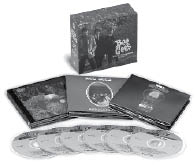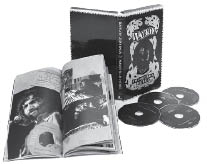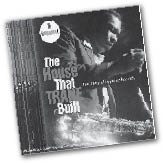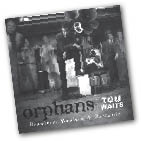Musically Gifted
by Donny Kutzbach
Yes, we at Artvoice love Christmas as much as you do, but even we start to hit that wall. There’s only so much of Ray Coniff Singers’ “Grandma Got Run Over by a Reindeer”—and even Run-DMC’s “Christmas in Hollis”—that we can take. So we know that there’s no better way to celebrate the season than by giving the gift of music and in bulk. What we mean is it takes the big box sets to deprogram the brain after hearing Mariah Carey’s “All I Want For Christmas” a thousand times. Besides, these lavish sets look better wrapped than those single CDs and iTunes gift cards. Here’s our picks:

Bee Gees
The Studio
Albums 1967-1968
(Reprise/Rhino)
Forget the silver lame and the slick disco production of their mega-selling 1970s records. There’s a reason why snobby pop aficionados rate the Brothers Gibb not far behind the Beatles and the Beach Boys, and this set gets right to the core of such lofty but due praise. The Bee Gees’ genius goes much, much deeper than the soundtrack of Saturday Night Fever. Upon their initial three releases, the Gibbs were still young lads—fraternal twins Maurice and Robin were indeed still in their teens—but exuded a staid maturity and that brotherly edge of having sung together since they could talk. The resulting perfect three-part harmonies and exquisite arrangements coalesced with Barry’s stellar songcraft, making for some of the era’s most sparkling psychedelic pop. This six-disc set overhauls Bee Gees’ First, Horizontal and Idea, including stereo and mono versions of each record along with corresponding discs of rarities, outtakes and B-sides. Here are three thoroughly unsung, near masterpieces in the most complete view and context they have ever been put in. Hopefully the Gibbss successive catalog titles, Odessa and Cucumber Castle, will follow in similar fashion.

Waylon Jennings
Nashville Rebel
(Legacy)
Rebel indeed. No one bucked the system like Waylon Jennings, and this exhaustive, career-capping, four-disc collection charts how a guy from Littlefield, Texas, with little more than a deep baritone voice and a Fender Telecaster, walked in at the ground floor of rock-and-roll history—courtesy of running buddy Buddy Holly—and went on to reinvent country music. While Jennings kickstarted the “outlaw” movement with Willie Nelson in the 1970s, turning his back on Nashville’s tired, formulaic ways by infusing country with raucous rock and roll and an outsider mentality, Nashville Rebel pulls from the pre-stardom, rugged road years, when Jennings could switch up between folk, R&B and Tex-Mex as deftly as he could between country and rock—as can be heard on versions of Gordon Lightfoot’s “(That’s What You Get) For Loving Me” and Chuck Berry’s “Brown-Eyed Handsome Man.” His masterful hits, like “Are You Sure Hank Done It This Way,” “Mamas Don’t Let Your Babies Grow Up to Be Cowboys” and Billy Joe Shaver’s genre-defining “Honky Tonk Heroes,” are here, as are some overlooked gems from late in his career, which ended with his untimely death in 2002. The 140-page booklet is loaded with rare photos and bountiful biography and liner material, including an essay by Lenny Kaye. Country music has had few icons on par with Waylon and Nashville Rebel knowingly celebrates that.

Various Artists
The House That Trane Built:
The Story of Impulse Records
(Impulse!)
More than just an overview of one jazz music’s most important labels, The House That Trane Built is like a directional sign of where jazz headed toward the end of the 20th century and where it continues to go. John Coltrane’s visionary playing and compositions were the zeitgeist of the day, and much of the steam behind Impulse and some of his most compelling work on the imprint—including “A Love Supreme: Part 1—Acknowledgement”—is here. But there’s much more to Impulse than Trane. While Coltrane’s name is on this set, it was producer/label head Bob Thiele who made it the most artist-friendly imprint in jazz in the 1960s. The label saw Count Basie (“Trey of Hearts” is here) and Ray Charles (sadly, not included) record in its studios, along with groundbreakers Sonny Rollins, Gil Evans, Albert Ayler and Charles Mingus. The toughest thing about The House That Trane Built is that with only four discs to encompass such a rich legacy—one indeed deserving of at least double that—the music is shoehorned into too narrow a space. Regardless, this set is a great primer on a critical period and particularly on the label that helped to shape it.

Tom Waits
Orphans: Brawlers,
Bawlers and Bastards
(ANTI-)
One of America’s most distinctive and celebrated artists brings 2006 to a roaring close with a fascinating, peephole view into some of his “lost” works. Waits, the rumbling-voxed singer/songwriter who has become an avatar of a uniquely below-the-surface brand of unclassifiable music, named this three-disc, 54-track collection appropriately: These were his songs without a family or home to cling to. Or, as Waits puts it—and he always knows how to put it best—these are “A lot of songs that fell behind the stove while making dinner.” Each disc has its own personality and descript style. Brawlers comprises the box set’s hard-nosed but grinning numbers, including sea chanteys and Ramones covers, while Bastards offers fascinating moments of Waits verité with oddball recitation numbers, coat-pulling carnival barking and nods to two of Waits’ biggest influences—Kerouac and Bukowski—via reinterpretations of their work. The finest of the three discs might be Bawlers, which celebrates brokedown, busted-hearted balladeering. This limited-edition set, including a 94-page hardbound book, is already getting tough to find, so start hunting it down now!
|
Issue Navigation> Issue Index > v5n50: Last-Minute Holiday Gift Guide (12/14/06) > Last Minute Holiday Gift Guide > Musically Gifted This Week's Issue • Artvoice Daily • Artvoice TV • Events Calendar • Classifieds |









 Current Issue
Current Issue